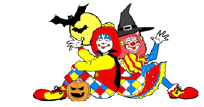Thankfully, there is now more understanding about how people with special needs or brain injuries experience the world around them. Loud noises and sudden movement is upsetting for them because they are very sensitive to such things. We now know that one must have sensory awareness when approaching them in any capacity. Entertainment is no exception.
There are many theatre companies now offering “sensory-friendly” versions of their shows. This includes reducing music/sound volume, avoiding complete theater darkness, noise-cancelling headphones, revealing who will be wearing masks or full makeup, avoiding strobe effects and a quiet room nearby containing fidgets and snacks. This elaborate preparation, however, is not possible for the mobile hospital clown.
A very important part of my hospital clown training was the check-in component. Once your role has been established and accepted in a given hospital, performance in any area can only begin after checking in with the charge nurse or other nursing staff. This is when the clown must drop the persona (although you may joke with employees before or after) and ask if there are any patients that should not be visited. Rooms with precaution signs on the door are avoided in order to prevent cross-contamination among patients, but patients who may find clowns upsetting must also be avoided, and this can include patients with special needs or brain injuries.
Some higher-functioning patients may be familiar with clowns and welcome them and the clown must be cautious in his or her approach. As with every patient, clowns must not jump out at or surprise the patient with special needs. They must not be loud or touch the patient without permission (again, this also goes for all patients). The performance itself must be short, gentle and go at a slower pace. Juggling or magic tricks must be simplified, and verbal wit should be easy to understand. Without insulting them, the entertainment used for babies (see Babies, The Audience) may be used for non-verbal patients or for those who do not make eye contact. As always, be mindful of body language and other cues they may give that demonstrate that it’s time to end the performance.
Patients with special needs usually have a family member or an aide with them at all times - they are very helpful in understanding what the patient is feeling and what they feel comfortable with. I have walked into a room in which the patient was so high-functioning that I couldn’t tell they had special needs. If I did something that they didn’t seem to understand, the family member would whisper something that made it clear that the patient has special needs, and I would adjust my performance.
With some preparation, understanding and precautions, hospital clowning can be enjoyed and appreciated by people at all cognitive levels.
 Lucy E. Nunez has been a theatrical performer since 2002 and an improv performer since 2003. She created Nurse Lulu for the Big Apple Circus Clown Care program in 2014. She is Baptist Children's Hospital first-ever resident clown! For more information please visit: www.sunnybearbuds.wix.com/buds
Lucy E. Nunez has been a theatrical performer since 2002 and an improv performer since 2003. She created Nurse Lulu for the Big Apple Circus Clown Care program in 2014. She is Baptist Children's Hospital first-ever resident clown! For more information please visit: www.sunnybearbuds.wix.com/buds

2 comments
Thank you so much!
You have fantastic insight, thank you for sharing. You are awesome…